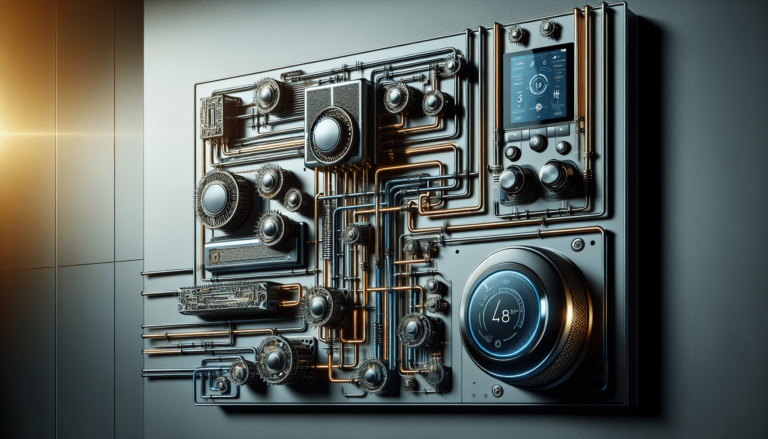

HVAC Services
Get Professional Repairs From The Area's Trusted HVAC Technicians. Ask About Our Services! We Offer Professional Heating & Cooling System Repairs And Guarantee Long-Lasting Results.
Got Question? Call us: (850) 678-2665Financing
Factors To Consider For Basement HVAC Integration
Discover the complexities of basement HVAC integration with our guide. Master comfort and efficiency by considering layout, climate needs, and system types for success.

Have you ever wondered what it takes to efficiently integrate an HVAC system into your basement? The process is often more complex than one might imagine, and understanding the various factors involved can make a significant difference in the comfort and efficiency of your home. Whether you’re in the midst of a renovation or planning a new installation, this guide will help you navigate the essentials.

Understanding Your Basement’s Unique Needs
Every basement is different, and its unique characteristics demand specific HVAC considerations. Knowing your basement’s particular needs is the first step toward an efficient HVAC integration.
Assessing the Space
Before you can integrate an HVAC system, you’ll want to have a thorough understanding of the space. Is your basement large and open or compartmentalized into several smaller rooms? The layout will affect airflow efficiency and the type of HVAC system suitable for your space.
Size and Configuration
A larger basement may require a more powerful HVAC system or even multiple units to ensure even heating and cooling. Alternatively, a segmented basement might benefit from zone-designated controls so you can adjust temperatures based on usage patterns.
Baseline Temperature and Humidity
Basements are notorious for having their own microclimates. They can often be cooler and more humid due to their below-ground position. Knowing your baseline temperature and humidity levels is vital for selecting the right system.
Control of Humidity
Proper humidity control is imperative. Too much moisture can lead to mold and mildew, while too little can cause discomfort and dry skin. Look for HVAC systems with built-in humidifiers or dehumidifiers for optimal comfort.
Types of HVAC Systems for Basements
Depending on your specific needs and circumstances, there are several types of HVAC systems you might consider for your basement.
Central Air Systems
Central air systems distribute cooled or heated air through a network of ducts. While often efficient, these systems might not easily adapt to older structures or intricate basement layouts without some modification.
Benefits and Challenges
Central air systems can provide consistent temperature control but might require additional work to service a basement, such as extending or modifying ductwork.
Ductless Mini-Splits
These systems eliminate the need for ductwork, making them ideal for basement integration where duct installation isn’t feasible.
Flexibility and Efficiency
Ductless mini-splits offer flexibility, allowing you to control the temperature of individual spaces, and are often more energy-efficient than central systems.
Portable and Window Units
For basements that only need occasional heating or cooling, portable air conditioners and heaters can offer a temporary solution.
Temporary Solutions
Although practical for short-term needs, these units generally lack the efficiency of more permanent systems and can only handle limited space.
Considerations for Installation
Several factors can affect the ease and success of your HVAC installation in a basement setting.
Access and Ventilation
Proper access to the installation site and ventilation is crucial for both installation and maintenance.
Installation Challenges
Basements often have limited access, making it harder to install larger systems. Ensure any unit you buy can be easily transported to your basement.
Electrical Requirements
Every HVAC system will have specific electrical requirements, which can be an important factor in your installation.
Power Supply Needs
You need to have the necessary power capacity to support a new HVAC system. A qualified electrician should verify adequate supply and panel capacity.
Professional Assessment
Hiring a professional to assess your space can be a wise investment. Their expertise can identify potential complications you might miss.
Cost Efficiency
While it might seem like an extra expense, professional evaluations often save money in the long term by preventing costly mistakes.
Long-Term Maintenance
Thinking about maintaining your HVAC system is just as crucial as considering its installation.
Regular Servicing
Just like any part of your home, your HVAC system will benefit from routine maintenance.
Benefits of Consistent Maintenance
Regular servicing can catch potential problems before they become costly repairs, ensuring your system remains efficient and reliable.
Filter Replacement
Changing air filters is one of the simplest and most important maintenance tasks.
Simplified Routine Tasks
Typically, filters should be replaced every three months, but basements, being prone to dust and debris, might require more frequent changes.
Use of Smart Technology
Many HVAC systems now offer smart technology that facilitates maintenance through notifications and remote monitoring.
Simplicity and Convenience
Smart thermostats can alert you when maintenance is needed, helping you keep your HVAC system running smoothly.

Energy Efficiency and Cost
A well-integrated HVAC system in your basement should be both efficient and cost-effective.
Initial Investment
Balancing long-term savings against upfront costs is essential when considering HVAC integration.
Comparing Costs
The initial investment might differ based on system type, complexity of installation, and additional features like ductwork or zoning systems.
Rebates and Incentives
Research potential rebates and incentives for installing energy-efficient HVAC systems in your area.
Saving More
Both federal and state programs sometimes offer tax credits and rebates that can significantly reduce the overall cost.
Long-Term Savings
Energy-efficient systems can yield noticeable savings on your utility bills over time.
Evaluating the Potential
When properly installed and maintained, efficient systems can dramatically reduce heating and cooling costs, offering long-term economic benefits.
Conclusion
Integrating an HVAC system into your basement is a multi-faceted project, with plenty to consider from space assessment to long-term maintenance. The goal is to create a comfortable, efficient, and adaptable environment in which you can control your climate as much as possible. By keeping these factors in mind, you’ll increase your chances of a successful HVAC integration in your basement. And the next time someone brings up basement renovations at a dinner party, you can gracefully step in with your newfound expertise—unquestionably admired by all.







